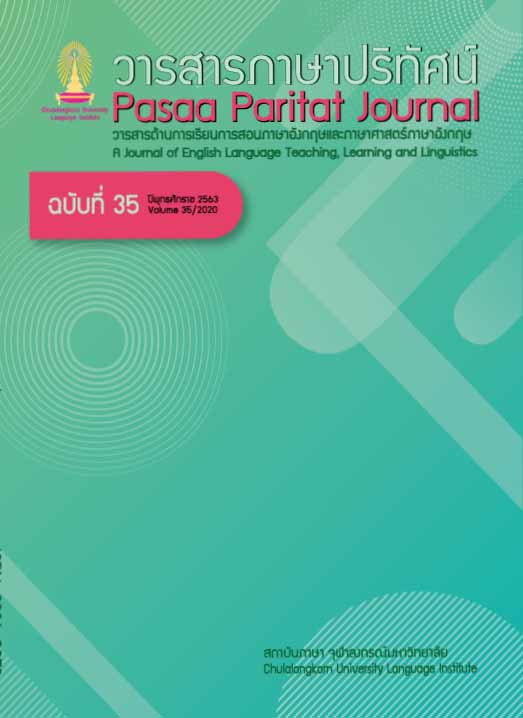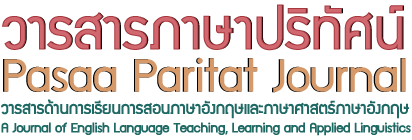การใช้คำอ้างอิง: กรณีการใช้คำบรรยายสีที่เกินความจำเป็น
คำสำคัญ:
การใช้ค าอ้างอิงบทคัดย่อ
Prior investigations (e.g., Davis & Katsos, 2009; Engelhardt et al., 2006;
Rubio-Fernández, 2016) suggest that native speakers of English tend to be
overspecified in their referring expressions by including unnecessary adjectival
modifiers that do not serve to differentiate the intended referent from other
objects in the context, and the most redundantly provided modifiers have
been found to be color terms. The phenomenon is known as color
overspecification, and contradicts the Maxim of Quantity (Grice, 1975), which
states that speakers are expected to provide sufficient information but no
more than is necessary for their interlocutors. This study was conducted on
Thai EFL speakers to examine whether the phenomenon also occurs in EFL
settings. The study examined the participants on their referring expressions in
which objects in comparison were in monochrome and in polychrome. The
experimental items were adapted from the study of Rubio-Fernández in 2016
as they could yield findings concerning the phenomenon. The findings
revealed that the majority of participants produced overspecified referring
expressions concerning color terms in the two experimental conditions. They,
however, did it significantly more often when objects in the context were in
polychrome. This suggested that shades of color play a role in reference
production as well. The findings also revealed underlying factors that could
influence the participants’ referring expressions. Overall, what is noteworthy is
that the results of the study have proven that color overspecification occurs
not only to native speakers but also to EFL speakers.
เอกสารอ้างอิง
Arts, A., Maes, A., Noordman, L. G. M., & Jansen, C. (2011). Overspecification facilitates object identification. Journal of Pragmatics, 43(1), 361-374.
Belke, E. (2006). Visual determinants of preferred adjective order. Visual Cognition, 14(3), 261-294.
Brown-Schmidt, S., and Konopka, A. E. (2011). Experimental approaches to referential domains and the on-line processing of referring expressions in unscripted conversations. Information, 2, 302-326.
Cummins, C., & Katsos, N. (2019). The Oxford Handbook of Experimental Semantics and Pragmatics. Oxford University Press, UK.
Davies, C., & Katsos, N. (2009). Are interlocutors as sensitive to over informativeness as they are to under-informativeness? Proceedings of
the Workshop on Production of Referring Expressions: Bridging Computational and Psycholinguistic Approaches. PRE-CogSci-09,
Amsterdam
ดาวน์โหลด
เผยแพร่แล้ว
เวอร์ชัน
- 2022-04-18 (2)
- 2022-04-18 (1)
รูปแบบการอ้างอิง
ฉบับ
ประเภทบทความ
สัญญาอนุญาต
ลิขสิทธิ์ (c) 2022 วารสารภาษาปริทัศน์

อนุญาตภายใต้เงื่อนไข Creative Commons Attribution-NonCommercial-NoDerivatives 4.0 International License.



